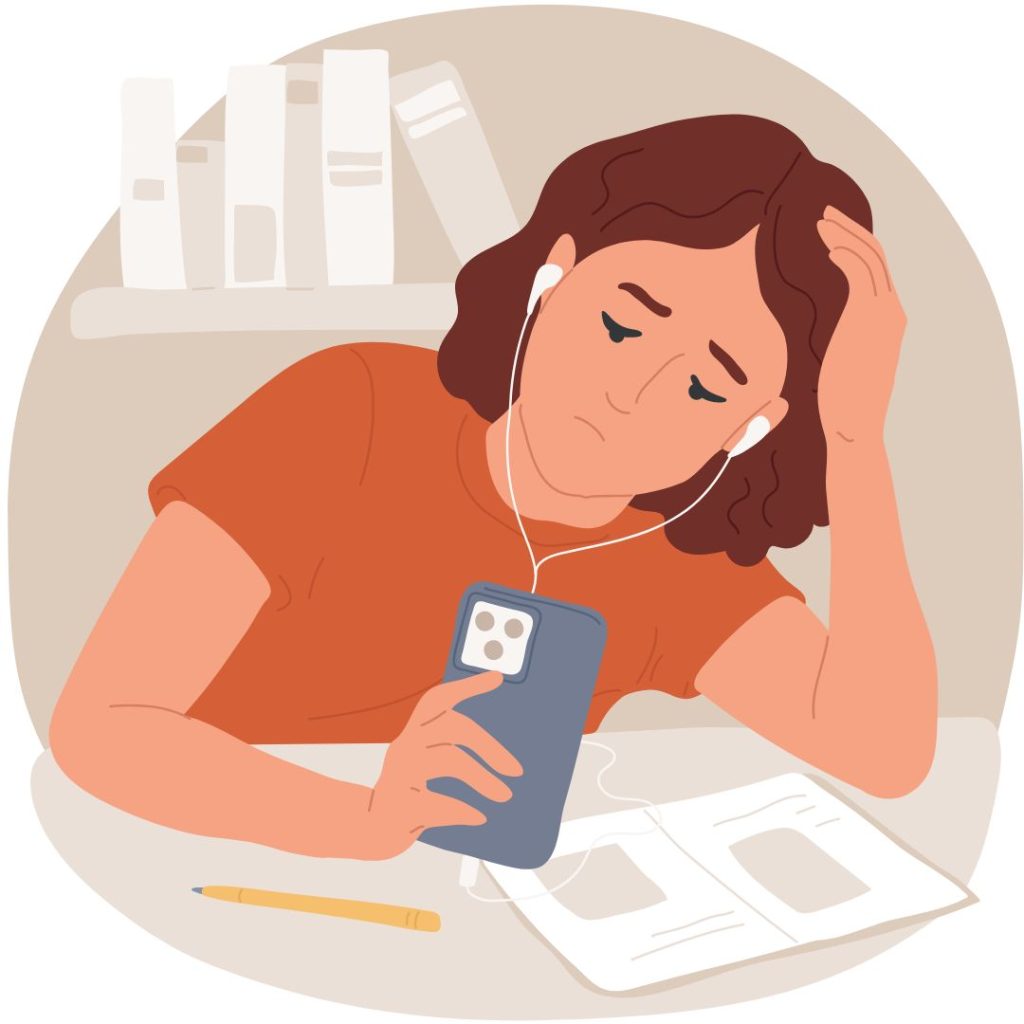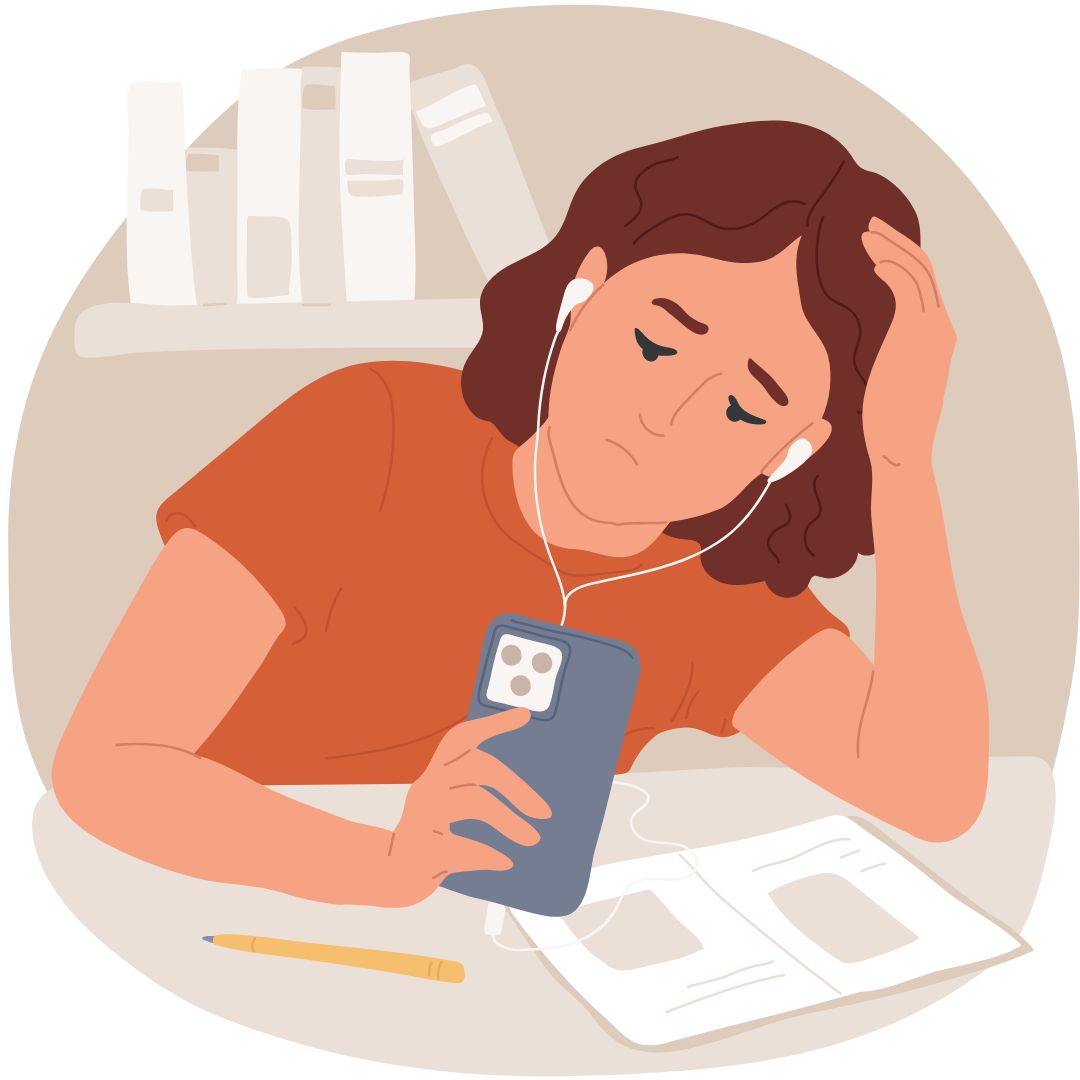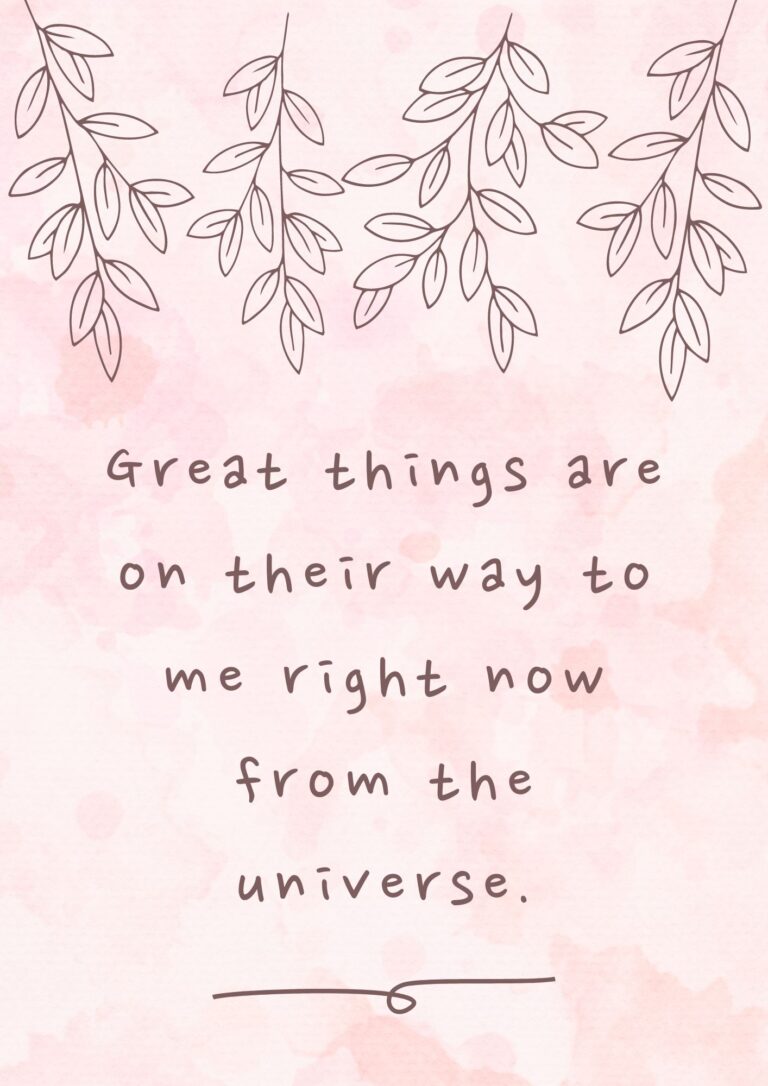Lethargic, sluggishness, zero energy, fatigued, decreased brain activity, unfocused. There are many terms to define procrastination and loss of productivity, there are also many unexplored reasons for it. There is, however, only one way forward…STOP PRO CYCLE!
Picture Anna, an op-ed writer, which means she spends a lot of time writing, proofreading, and editing pieces of written art.
She works remotely, which means she gets to choose her working hours, but this also means that the flexibility can get to her head.
She gets bleary-eyed from too much work and is prone to falling into a procrastination cycle.
Her deadlines get the best of her and she fails to deliver her work on time. She wants to stay energized and productive during her working hours.

There is no way Anna can hack this. Some stop procrastination tips may be of help, but the first step is to acknowledge her shortcomings. Only then she can work on them to stop this pro cycle.
Here are some procrastination statistics to put it all in perspective for you!
6 Telling Procrastination Stats
- 20-25% of people procrastinate chronically.
- 88% of workers procrastinate 60+ minutes daily on the job.
- 80-95% of college students procrastinate to some degree.
- 75% of people consider procrastination a personality trait/problem.
- Procrastination costs the US economy an estimated $70 billion per year. (1)
We All Do It!
Adults procrastinate daily at the workplace. Students procrastinate and don’t submit their assignments on time.

Women procrastinate more than men…but we all are prone to procrastination.
We’ve all done it, telling ourselves we’ll relax for just one more hour before we start work, only to have that hour turn into five.
And so what happens when you hassle to meet a deadline? The quality of work you provide is drastically affected as you get no time to revise and check for errors or even to research thoroughly.
This reduced productivity can induce stress and anxiety among individuals. If you want to know how to manage anxiety, I shared some coping strategies to calm down anxiety.
EFFECTS OF PROCRASTINATION AND BEING LAZY
Procrastination can result in several adverse physical and mental health effects. Putting things off typically builds anxiety, which can cause major issues.
Here are some examples of how procrastination impacts your body and mind:
- 11.55% of people procrastinate primarily because of an underlying depression.
- Procrastination fosters depression, which creates a vicious cycle of making procrastinators more depressed. Procrastinators are also more likely to sleep poorly and feel anxious, which can contribute to feelings of depression.
- 94% of people feel unhappy about their procrastination.
Further, 18% of those people say this effect on their happiness is “extremely negative.” - The prevalence of chronic procrastination has grown 4x larger in the past 30 years.
In 1978, only 5% of the population claimed to be chronic procrastinators. Today, more than 4x the number of people say the same. (2)
How To Stop Procrastinating Pro Cycle?
You can’t really ‘Stop’ the Procrastination cycle rather you can break it one day at a time. I highly recommend you read the book “The Procrastination Equation” by Dr. Steel. (3) The book is filled with gems and points towards motivation as a guiding factor to stop pro cycle before it begins.
“Should I tackle that work assignment or watch another episode of my favorite TV show?”—you tend to choose the action you’re most motivated for.”
Am I Procrastinating? – The Telltale Signs
Yes, there are several Procrastination Scales that you can use to identify if it is manifesting in you.
Or if you don’t want to indulge in a Google quest for one, I have compiled a list of procrastination signs and symptoms for you which may come in handy.
1: I’ll Do It Tomorrow
You constantly find yourself pushing tasks back, muttering promises of “tomorrow” or “later.” This internal dialogue becomes a habit, delaying action and creating a cycle of stress.
2: Stuck in Neutral
You know a task is important, but you just can’t seem to get started. It’s like your mental engine is stuck in neutral, overwhelmed by the prospect of beginning.
Here are some relatable examples from daily life to illustrate this feeling:
You open your email and see a mountain of unread messages. The thought of sorting through them, prioritizing responses, and tackling urgent matters feels like wading through quicksand.
A big work presentation is due next week, but the thought of putting together the slides, rehearsing your delivery, and facing the audience fills you with dread. It’s easier to keep pushing it back and hoping for a miracle solution.
Your room has become a cluttered haven of clothes, books, and miscellaneous items. The idea of cleaning and organizing feels daunting, so you keep putting it off, dreading the mountain of work ahead.
You signed up for a gym membership with the best intentions, but the thought of putting on workout clothes, driving to the gym, and breaking a sweat feels insurmountable. Stepping through the gym doors feels like a distant dream.
3: Simple Tasks Take Longer
Simple tasks that shouldn’t take long somehow balloon into elaborate projects. You find yourself spending unnecessary time on minor details, a way to avoid tackling the core of the assignment.
4: Focusing On the Unimportant
When faced with a deadline, do you find yourself cleaning the house, organizing your sock drawer, or tackling any other minor task besides the one due? This avoidance tactic is a classic sign of procrastination.
5: Always Scrambling Last-Minute
You wait until the absolute eleventh hour to get started, fueled by adrenaline and a surge of panic. This last-minute scramble often leads to rushed work and missed deadlines.
You convince yourself there’s more time, you’ll be more motivated later, or there are more urgent matters at hand.
This “mental gymnastics” justifies putting it off. The closer the deadline looms, the higher your stress levels climb.
The initial anxiety morphs into a feeling of helplessness. The approaching deadline forces you into a frenzy, often resulting in rushed, low-quality work and heightened self-criticism.
6: Decision Paralysis
Even small choices become overwhelming, leading to further delays. You get stuck in an analysis loop, unable to make a decision and move forward.
7: Unending Chain Of Procrastination
You make intentions to improve your work habits, vowing to start earlier next time. But these promises fall through, and the cycle of procrastination continues.
8: Unnecessary Delay
The core feature is the tendency to put things off even when there’s no logical reason to do so.
9: Negative Consequences
The delays often lead to negative outcomes like missed deadlines, poor work quality, or increased stress.
10: Intention-Action Gap
You know you should get started, but there’s a disconnect between your intentions and actions. You want to do the task, but something holds you back. (4)
Understanding Your Procrastination
The next step is to gain a deeper understanding of your procrastination habits to stop pro cycle. Here are a few important features that can help you catch procrastination in its tracks.
- Frequency: How often do you put things off?
- Duration: How long do you typically delay tasks?
- History: Is this a recent habit, or have you struggled with procrastination for a while?
- Domains: Does it affect all areas of your life or specific tasks?
- Impact: Does procrastination lead to missed opportunities or negative emotions?
- Severity: How much does procrastination affect your overall well-being?
By recognizing the signs of procrastination and understanding its impact, you can take steps to overcome this habit and become a more productive and fulfilled individual.
Stop Pro Cycle NOW: How To Stop Procrastinating And Get Productive
As much as procrastination is bad in your daily life, it is also very difficult to follow well-meaning stop procrastination tips.
It is a chronic illness that does not go away just because you love your job or you change your lifestyle.
It is a mental exercise in unlearning and relearning your work routine. I have collected 5 research-based strategies for you to combat procrastination and start becoming productive today!

1: Reverse Psychology Your Procrastination
Research by Dr. Piers Steel identifies seven core triggers that push individuals towards procrastination. By understanding these triggers and applying targeted strategies, we can significantly reduce procrastination and enhance productivity.
One prominent trigger is a perception of a task being boring or tedious. In a study published in the Journal of Behavioral Decision Making (2010), researchers found that gamifying tasks, such as setting time limits or incorporating small rewards, significantly increased motivation and reduced procrastination among participants.
Another trigger is task ambiguity. A 2011 study in the Journal of Applied Psychology demonstrated that individuals are more likely to procrastinate on unstructured tasks that lack clear steps or deadlines.
The researchers suggest implementing workflow management techniques, such as breaking down large tasks into smaller, more manageable steps, to enhance clarity and reduce procrastination.
These findings highlight the importance of addressing the root causes of procrastination. By identifying the specific triggers associated with a particular task, we can develop targeted strategies to enhance motivation and overcome procrastination.
For instance, if the fear of failure is a trigger. Partnering with a colleague for peer review and support can mitigate anxiety and promote task completion.
2: Start Small, Build Energy
Research suggests a powerful technique for overcoming procrastination: working within your resistance level.
Procrastination often stems from an inflated perception of the effort required for a task. First, identify your resistance when faced with a daunting task, and acknowledge your initial resistance.
How long does focusing on it seem unbearable? Be honest with yourself. Scale Down the Effort: Instead of diving headfirst into an hour of research, could you manage 20 minutes?
Studies show that reducing the perceived effort can significantly decrease procrastination.
Begin with a manageable chunk of time. Completing a smaller, achievable task can build momentum and make the entire project seem less overwhelming.
This approach aligns with research by Dr. Joseph Ferrari, who emphasizes the importance of “action initiation” in overcoming procrastination.
By starting with a manageable effort level, we can break the cycle of resistance and achieve greater progress in the long run.
3: Take That First Step
Procrastination often thrives on the initial hurdle of starting a task.
Research by Dr. Neil Fiore suggests that the perceived difficulty of a task is often inflated compared to reality.
This can lead to a phenomenon known as “task aversion,” where we actively avoid beginning due to anticipated unpleasantness.
Here’s how to overcome this inertia:
- Start Small, Overcome Resistance: Taking the first step, even a small one, can significantly reduce procrastination. Studies show that initiating action, regardless of duration, can disrupt the cycle of resistance and make continued work more likely.
- The Zeigarnik Effect: Our brains have a tendency to remember unfinished tasks more vividly than completed ones. This phenomenon, known as the Zeigarnik effect, can be harnessed to our advantage. By starting a task, we initiate a mental process that keeps it at the forefront of our minds, increasing the likelihood of returning to it and ultimately completing it.
4: The Ripple Effect
Procrastination isn’t just about missed deadlines. It carries a significant financial burden, particularly when applied to long-term goals like retirement savings.
Studies have shown that delaying retirement contributions can lead to a substantial shortfall in accumulated funds.
This translates to a potential decrease in lifestyle, increased financial stress in later years, and potentially limited access to healthcare.
Considering the long-term impact on your well-being can be a powerful motivator to overcome procrastination and take action towards your future goals.
5: Device-Enabled Procrastination
Research suggests a strong correlation between increased screen time and procrastination.
A 2015 study in Computers in Human Behavior found that individuals with higher levels of smartphone addiction were more likely to procrastinate on tasks.
This susceptibility is heightened when dealing with ambiguous or unstructured tasks, two well-documented procrastination triggers.
The constant barrage of notifications and the ease of digital diversions can easily derail focus and impede progress.
To combat this, a proactive approach is essential. Disabling distracting websites and applications can significantly reduce procrastination. Studies by Dr. Nir Eyal, a leading expert on behavioral design, highlight the effectiveness of pre-commitment strategies in curbing digital distractions.
By eliminating the choice to access distracting websites or social media, we remove a significant barrier to productivity.
There are proven ways to combat procrastination so that it doesn’t get in the way of accomplishing your most important tasks.
The next time you resist a task, consider whether it sets off any of the procrastination triggers, work within your resistance level, force yourself to get started on it, list the costs of putting the task off, or disconnect from the internet.
If you’re anything like me, you’ll find yourself procrastinating a lot less often.
Are you searching for your ‘WHY’? Here is a list of 20 soul-searching questions I compiled for you to find your ‘WHY’ through Ikigai.
If you want to delve a bit deeper and stop pro cycle immediately, here are a few recommended reads for your reading pleasure.
1: The More You Do, The Better You Feel by David Parker
This book explores the concept of overcoming procrastination and its positive impact on mental well-being.
While the book’s specific methods haven’t been subjected to rigorous scientific testing, it offers a practical framework based on the established psychological principle of behavioral activation.
This approach posits that increasing activity levels can lead to improvements in mood and overall well-being. If you’re struggling with procrastination and its associated negative emotions, this book might be a valuable resource to explore alongside potential cognitive-behavioral therapy interventions.
2: Getting Things Done by David Allen
Getting Things Done (GTD) by David Allen is a widely popular productivity system designed to reduce stress and enhance focus.
While not a scientifically validated therapy, GTD offers a structured approach to task management and information organization. Research suggests that effective task management can improve cognitive function and reduce anxiety.
The core GTD principles, such as capturing all tasks and projects, organizing them into actionable steps, and conducting regular reviews, may benefit individuals struggling with information overload and feeling overwhelmed.
References:
- https://www.zippia.com/advice/procrastination-statistics/#:~:text=20%2D25%25%20of%20people%20procrastinate,procrastination%20a%20personality%20trait%2Fproblem.
- https://doi.org/10.1371%2Fjournal.pone.0148054
- https://www.amazon.com/Procrastination-Equation-Putting-Things-Getting/dp/0061703621
- https://solvingprocrastination.com/procrastination-signs-symptoms/#:~:text=Signs%20and%20symptoms%20of%20procrastination,-The%20following%20are&text=Postponing%20things%20you%20don’t,making%20decisions%20for%20too%20long.





